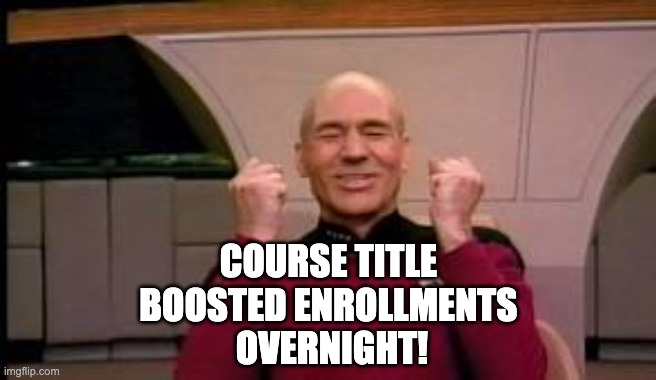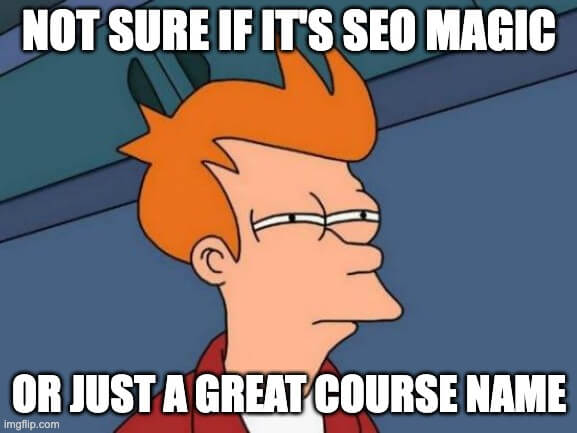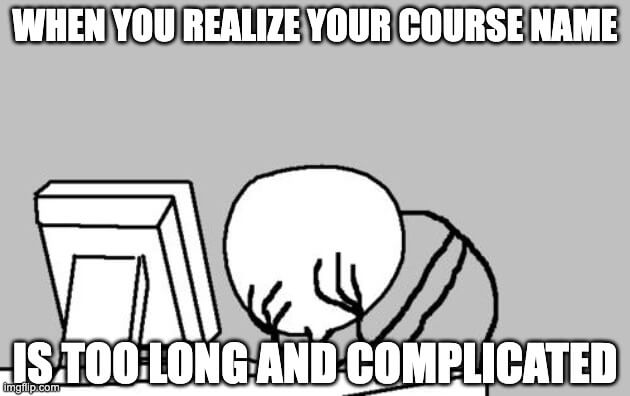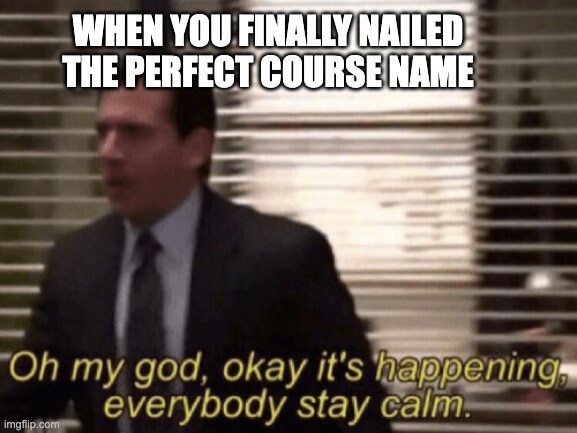Get 50 customized Course Names / Titles for your online course (+ 50 taglines) based on YOUR unique situation.
Simply answer the 2 simple questions below:
Course Name Generator
Please review your answers, then click "Generate".
What’s your course about?
Who is your audience?
In a crowded online course space, your course title is your first chance to make a dent.

It’s not just about getting attention; it’s about communicating the essence of your course in a way that speaks to your target students.
A good title can increase click through rates, enrollments and revenue.

Let’s see how you can create a title that stands out in search and attracts your target audience.
Why a Good Course Title Matters
A good title/name is important for several reasons:
Gets Attention
In a crowded online course space, a good title helps you stand out. With so many options to choose from, learners make quick decisions based on first impressions. A good title can be the difference between a student clicking on your course or scrolling past it.
Increases Click-Through Rates:
A well crafted title can get more people to click and learn more about your course. That initial interest is key as it gets potential students to your course description where they can dig deeper into what you offer.
Increases Enrollment
By communicating what students will learn, you increase the chances of them enrolling. A descriptive title sets clear expectations and helps students feel that your course will meet their needs.
Improves Discoverability

A good title gets your course more visibility in search engines, so students can find you. Include relevant keywords and your course will show up in search results when students are looking for topics you cover.
.
While your title brings students in, your checkout closes the sale. You can keep 100% of your sales revenue when you use CartMango to sell. For a limited time, grab a CartMango account for $0/month + 0% commission (totally free). No credit card required.
.
Understanding Your Online Course
Before you go ahead with your online course creation, you need to know your course inside out:
What’s Your Course Topic
Make sure you’re clear about what your course is about. Think if it’s broad or niche.
Knowing this will help you create a title that describes what students will learn which is important to attract the right audience.
A simple title helps students quickly understand what your course offers and are more likely to enroll.
Who’s Your Audience
Who are you targeting? Knowing your audience’s needs and interests is key. Are you targeting beginners who want a basic introduction or advanced learners who want in-depth, specialized knowledge?
By matching your course title to your audience’s level and interests, you’re speaking directly to them. That connection can make your course more appealing and relevant and increase the chances they’ll want to learn more and enroll.
A targeted title helps your course stand out and speak to the students you want to attract, whether they’re just starting out or looking to deepen their expertise.
Benefits
What will students get? Focus on the unique value of your course. Whether it’s new skills, personal growth or career advancement, highlighting these benefits can make your course more attractive.
Level and Format
Beginners or advanced learners? Video or text based? These details can impact how you title your course. For example “Beginner’s Guide” vs “Advanced Techniques” sets different expectations.
Now you know what to look for. So how do you craft a clear and concise course name?
Naming Your Course

When it comes to naming your course, keep it simple:
Simple Language
Don’t use jargon or technical terms that might confuse students. You want to make it accessible from the start.
Brief
Keep it short—5-7 words—so it’s easy to read and remember. Long titles can be overwhelming and get lost.
Action Verbs
Words like “Master,” “Learn” or “Discover” can make your title more interesting. They imply action and outcomes which is what learners are looking for.
A clear and concise title helps students quickly understand what your course is about and are more likely to enroll.
Communicating Emotion and Value
Your course title should evoke emotion and communicate value:
Emotional Words
Words that evoke excitement or curiosity can grab students. Try “Unlock,” “Transform” or “Empower” which implies positive change.
Transformation
What change or result can students expect? Make this clear in your title. For example “Transform Your Career with Data Science” implies a big positive outcome.
Social Proof
If applicable use “best-selling” or “top-rated” to build credibility. This grabs attention and instills confidence in potential students about the course.
By focusing on emotional appeal and value proposition you make your course more attractive to students.
.
Your course title creates desire. Your checkout needs to capture it instantly. Claim your CartMango account for $0/month + 0% commission (totally free) to eliminate friction with mobile-optimized checkouts & 125+ payment methods that convert browsers into buyers. Free migration included.
.
Optimizing for Search and Discovery
To make sure your course is found online optimize your title for search engines:
Include Keywords

(thanks to Imgflip for the awesome memes btw)
Use keywords that students might search for. This increases the chances of showing up in search results when those terms are searched.
Conduct Keyword Research
Find popular terms in your niche to include in your title. Tools like Google Keyword Planner or SEMrush can help you find those keywords.
Use Long-Tail Keywords
These are specific phrases that target specific search queries, less competition. For example instead of “Photography” use “Beginner Photography for Nature Lovers.”
Use numbers or statistics in your title to make it more specific and interesting. For example “10 Steps to Mastering Photography.”
Checking the Acronym and Domain Name
Before finalizing your course name consider these practical things:
Acronym
Make sure any acronym formed by your course title isn’t embarrassing or confusing. This is especially important if you’ll be using abbreviations in marketing materials.
Domain Name Availability
If you’ll have a dedicated website check if the domain name is available and easy to remember. A matching domain name helps to maintain consistency across platforms and makes it easier for students to find you online.
A consistent domain name helps to create a unified brand across all platforms.
Unique and Memorable Course Name
To make your course name memorable:
Avoid Generic Titles
Steer clear of clichés that don’t add value or differentiation. Titles like “The Ultimate Guide” are overused and won’t stand out from similar courses.
Use Literary Devices
Techniques like alliteration or rhymes can make titles more memorable. For example “Photography Fundamentals” can become “Picture Perfect Photography.”
Your title should reflect your brand and the tone of the course content.
Finalizing Your Course Name
Before you finalize your course name test it with real people:
Ask Your Audience
Ask students what they think of different options. Their feedback will reveal preferences or concerns you hadn’t thought of.
Engaging with your target audience in this way not only helps you refine your course title but also builds a sense of community and involvement. You can do surveys or focus groups to get detailed feedback so your course name matches the expectations and interests of those you’re targeting.
Also consider involving colleagues or industry experts in your feedback loop to get different perspectives and make your course name more appealing and relevant.
A/B Testing
Test different titles to see which one gets more interest. This will give you data driven insights on which title resonates best with your target audience.
Choose a title that works across multiple marketing channels and is easy to remember and spell.
.
Now that you have a memorable course name, make the buying experience just as smooth. Grab your CartMango account for $0/month + 0% commission (totally free) & start selling in 1 minute. Direct Stripe/PayPal payouts & automated fulfillment included. No credit card required.
.
Wrapping Up

Use clear language, emotional appeal, and keywords to create a winner.
Test different options with your audience to make sure it sticks.
You’re ready to go! Be sure to use our Free Course Name Generator above to instantly spit out 100 name ideas for your online course, along with explanation for each.
Related
- Easy Digital Downloads vs Payhip: the revenue ransom (2026 )
- Easy Digital Downloads vs Gumroad: the income handcuffs (2026)
- Easy Digital Downloads vs SureCart: the revenue hostage (2026)
- SureCart alternative: the revenue trap no one mentions (2026)
- 8 Ejunkie alternatives: the cart stuck in 2009 (2026)
- Easy Digital Downloads vs ThriveCart: the piracy problem (2026)
- Sellfy alternative: escape the revenue lockout (2026)
- 7 Payhip alternatives & the captive income (2026)
- 7 SendOwl alternatives for digital creators (2026)
- Best Gumroad alternative in 2026: 7 options compared

 Do NOT refresh this page. It takes a few moments to generate your request.
Do NOT refresh this page. It takes a few moments to generate your request.